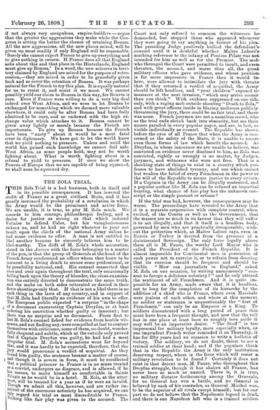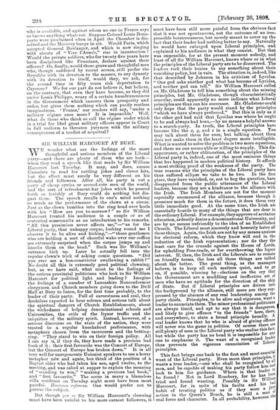THE ZOLA TRIAL.
THIS Zola Trial is a bad business, both in itself and in its possible consequences. It has lowered the credit of France as a great civilised State, and it has greatly increased the probability of a revolution in which the Army would be the prominent and active force. We are unable, it is true, to pity M. Zola much. We concede to him courage, philanthropic feeling, and a desire for justice as strong as that which induced Voltaire to defend Calas, but his vaingloriousness sickens us, and he had no right whatever to pour out insult upon the chiefs of the national Army unless he had some evidence to offer. A man is not entitled to libel another because he sincerely believes him to be libel-worthy. The drift of M. Zola's whole accusation, stated in the Aurore with the force belonging to a master of the pen, is that the group of Generals at the head of the French Army condemned an officer whom they knew to be innocent to a living death to secure some professional, or by possibility national, end. His counsel reasserted that over and over again throughout the trial, only occasionally falling back upon the theory of blunder, the cross-examina- tion was entirely directed to demonstrate the same truth, and the mobs on both sides reiterated or denied in their fierce shoutings only that. If that is not a libel there is no such thing in the laws of any country, and in support of that M. Zola had literally no evidence of his own to offer. The European public expected " a surprise " in the shape b. of a document exonerating Captain Dreyfus, or at least ordering his conviction whether guilty or innocent ; but there was no surprise and no document. From first to last M. Zola's counsel fished for evidence from hostile wit- nesses, and not finding any, were compelled at last to content themselves with criticisms, some of them, no doubt, wonder- fully eloquent and subtle, which at the outside only proved that if Captain Dreyfus was guilty, he had had a most irregular trial. M. Zola's accusations went far beyond that, and it was hardly to be expected, therefore, that the 31117 would pronounce a verdict of acquittal. As they found him guilty, the sentence became a matter of course, and though it is severe in form, it must be recollected that a political prisoner in France is in no sense treated ra convict, undergoes no disgrace, and is allowed, if he Tsai' means, to make himself as comfortable in Sainte rela.pe as he would be in a hotel. M. Zola, at the utter- !cis% will be treated for a year as if he were an invalid. Though we admit all this, however, and are rather im- Patient of the enormous notoriety he has acquired, we can only regard his trial as moat discreditable to France. Nothing like fair play was given to the accused. The Court not only refused to summon the witnesses lie' demanded, but stopped those who appeared whenever they were going to say anything in favour of his plea. Thepresiding Judge positively bullied the defendant's, counsel until it is doubtful whether Maitre Laborrs, scathing reference to the infamy of Pontius Pilate was net intended for him as well as for the Premier. The maw- who thronged the Court were permitted to insult, and evens threaten, the accused, and worse than all, the great military officers who gave evidence, and whose positions is far more impressive in France then it would bee here, were allowed to intimidate the jury with threats that if they returned a verdict of acquittal, the Army should be left headless, and "your children" exposed to- massacre at the next invasion, " which may arrive sooner- than you think." With evidence suppressed on. one side- only, with a raging mob outside shouting "Death to Zola.," and with great officers inside in blazing uniforms publicly threatening the jury, there could be no fair trial, and there- was none. French jurymen are not a nameless crowd, who-• as the trial ends shrink back into obscurity, but see their names paraded in every popular paper, and are, in fact, as visible individually as counsel. The Republic has shown. before the eyes of all France that when the Army is con- cerned or the safety of the State, it is unable to secure., even those forms of law which benefit the accused. As. Dreyfus, in whose innocence we are unable to believe, was convicted on evidence never disclosed to him, so Zola was convicted, rightly or wrongly is no matter, by Judges, jurymen, and witnesses who were not free. That is a., shocking state of things to exist in a country which pro- fesses to have abolished tyranny, and one which cannot but weaken the belief of every Frenchman in the power or the will of the Republic to secure justice to every citizen„. If a Captain in the Army can be illegally sentenced, and. a popular author like M. Zola can be refused an impartial hearing, what chance of fair play has the unknown. con- - script or the simple peasant or artisan ?
If the trial was bad, however, the consequences may be. worse. The proceedings have revealed to the Army that it is a separate corporation with complete control, when excited, of the Courts as well as the Government, that' the masses are so much in its favour that they will suffer- it to act illegally, and that it itself is a headless body, governed by men who are practically irresponsible, with- out the protection which, as Maitre Labori says, even in Russia or Turkey is derived from the presence of a disinterested Sovereign. The only force legally above them all is M. Faure, the worthy Lord Mayor who is called the President of the French Republic. It is almost impossible for Continental men in possession of such power not to exercise it, or to refrain from desiring; that its exercise should be frequent and should be- -visible. " How can journalists in England," asked M. Zola on one occasion, by writing anonymously " con- sent to forego a delicious notoriety ? " and he only uttered: the sentiment of all Frenchmen. And it is quite im- possible for an Army, made aware that it is headksa, not to long for the completion of its hierarchy by the, addition of a chief who in France, where even Marshals- were jealous of each other, and where at this moment. no soldier or statesman is unquestionably the " first of Frenchmen," can only be an Emperor or a King. To soldiers discontented with a long period of peace this) must have been a frequent thought, and now that the vein has in one place at least been so roughly torn aside it may well be an imperative desire. " The Staff " is too• impersonal for military loyalty, more especially when, as... one imprudent French writer reminded it on Thursday, it has for fifty years had no occasion to write a bulletin of victory. The soldiery, we do not doubt, thirst to see s trained soldier at their head; and if the populace think that in the Republic the Army is the only institution, deserving respect, where is the force which'will resist a. military revolution to be found ? Certainly it does not. exist in that decent man, M. Faure, who throughout this Dreyfus struggle, though it has shaken all France, has never been so much as named. There is, it is truo,, no military dictator forthcoming among the Generale, for no General has won a battle, and no General is believed by each of his comrades, as General Miribel to be the superior of all rivals except himself ; but for our part we do not believe that the Napoleonic legend is dead, and there is one Napoleon left who is a trained soldier.. who is available, and against whom no one in France says or knows anything whatever. Suppose Colonel Louis Bona- parte were proclaimed when in April the Chamber is dis- solved and the Ministry hangs in air. Would Paris, which accepted General Boulanger, and which is now ringing with shouts of " Vive l'Armee," rise in insurrection ? Would the private soldiers, who for twenty-five years have been disciplined like Prussians, declare against their -officers ? Or, finally, would those grave and thoughtful men who, though saddened by recent scenes, still prefer the Republic with its devotion to the masses, to any dynasty with its devotion to itself, would they, we ask, for the second time in fifty years risk deportation to Cayenne ? We for our part do not believe it, but believe, on the contrary, that even they have become, as they did under Louis Philippe, weary of a certain humdrum miness in the Government which ensures them prosperity and order, but gives them nothing which can pacify restless imaginations. France,' our readers will say, under a military regime once more ? It is impossible.' Well, what do those who think so call the regime under which in a trial for libel great military officers appear in Court in full uniform to threaten jurymen with the military -consequences of a verdict of acquittal?







































 Previous page
Previous page